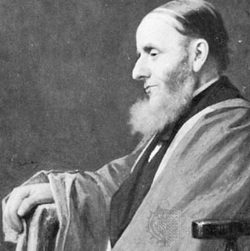Alexander Bain (1818-1903)

Alexander Bain was born in Sutherland in the far north of Scotland. He went to school there and at an early age took up the profession of a weaver. But in 1836 he enrolled as a student in Marischal College, one of Aberdeen’s two universities, where he proved a distinguished student, especially in mental philosophy, mathematics and physics. Towards the end of his degree course he became a contributor to the Westminster Review, and this began his lifelong friendship with the philosopher John Stuart Mill. In 1841, Bain substituted for the professor of moral philosophy at Marischal, who had fallen ill, and he taught for three successive terms, while continuing to write for the Westminster Review. During the same period he helped Mill with the revision of the manuscript of his System of Logic (1842) and year later published the first review of the book.
In 1845 Bain was appointed professor of mathematics and natural philosophy in the Andersonian University of Glasgow (predecessor of the University of Strathclyde) but he found it too constricting and resigned just one year later to devote himself to writing. In 1848 he moved to London, taking a Government post, and soon joined the brilliant circle of intellectuals that included George Grote and John Stuart Mill.
Bain’s first major work was published in 1855 -- The Senses and the Intellect, followed four years later by The Emotions and the Will. These books established him as a foundational contributor to the newly emerging study of psychology. He retained his connection with philosophy however, as an examiner in logical and moral philosophy to the University of London, and as an examiner in moral science for the Indian Civil Service examinations.
In 1860 Alexander Bain was appointed to a Regius Chair of Logic at the newly created University of Aberdeen, an amalgamation of the two colleges, King's and Marischal. The Chair also carried responsibility for the teaching of English, and Bain set about giving both subjects a higher profile. His influence on education in Scotland at school as well as university level was considerable. He oversaw to the preparation of new textbooks on English grammar that advocated original methods which subsequently secured wide acceptance.
Bain held the Chair at Aberdeen for twenty years, but his main philosophical writings had already published by the time he was appointed. His most notable philosophical achievement as Regius Professor was the establishment of Mind, a philosophy journal that went on to become one of the most prestigious in the world. The first number appeared in January 1876, and for several years Bain supported it financially as well contributing many important articles and discussions. In 1868, he published a philosophy textbook - the Manual of Mental and Moral Science -- and in 1870 a textbook on Logic. His services to education in Scotland were recognized by the University of Edinburgh’s conferment of an honorary degree of doctor of laws in 1871.
Alexander Bain was succeeded in 1880 by William Minto, one of his most brilliant pupils, but he remained active in publishing and academic life for many years thereafter. Though influential in his time as a logician and grammarian, his enduring reputation is as one of the founders of modern psychology. He was the first in Great Britain to systematically relate mental states to physiology, and he was the originator of the theory of psycho-physical parallelism, which forms the basis of much modern psychology.
Post-Enlightenment Philosophers
- Lady Mary Shepherd (1777-1847)
- Thomas Brown (1778-1820)
- Sir William Hamilton (1788-1856)
- Thomas Carlyle (1795-1881)
- James Frederick Ferrier (1808-1884)
- Alexander Bain (1818-1903)
- Alexander Campbell Fraser (1819-1914)
- James Hutcheson Stirling (1820-1909)
- John Veitch (1829-1894)
- Henry Calderwood (1830-1897)
- Edward Caird (1835-1908)
- Robert Flint (1838-1910)
- William Minto (1845-1893)
- Sir Henry Jones (1852-1922)
- David George Ritchie (1853-1903)
- Andrew Seth Pringle Pattison (1856-1931)
- James Seth (1860-1925)
- Robert Latta (1865-1932)
- Norman Kemp Smith (1872-1958)
- Archibald Allan Bowman (1883-1936)
- John Macmurray (1891-1976)
- C A Campbell (1897-1974)
- David Daiches Raphael (1916-2015)
- George Elder Davie (?)